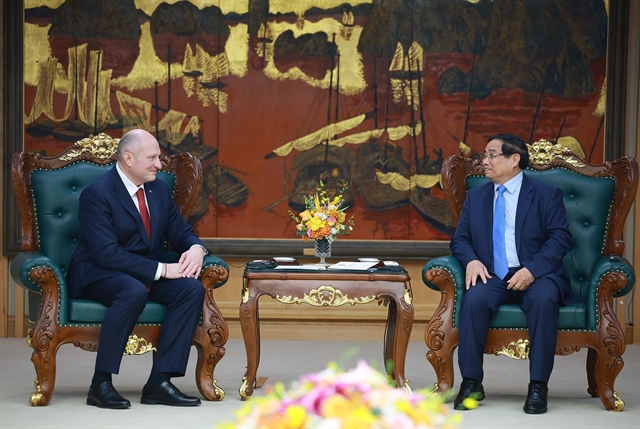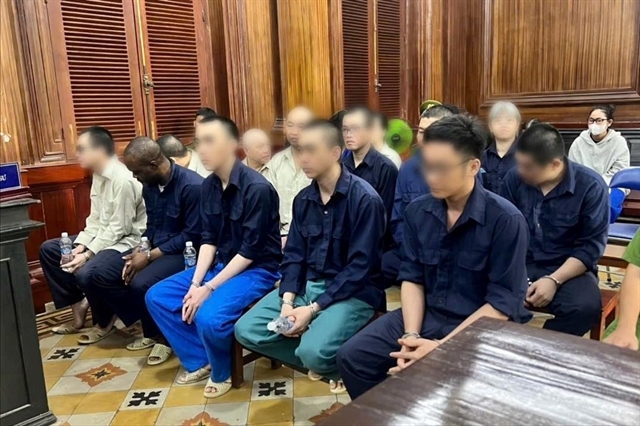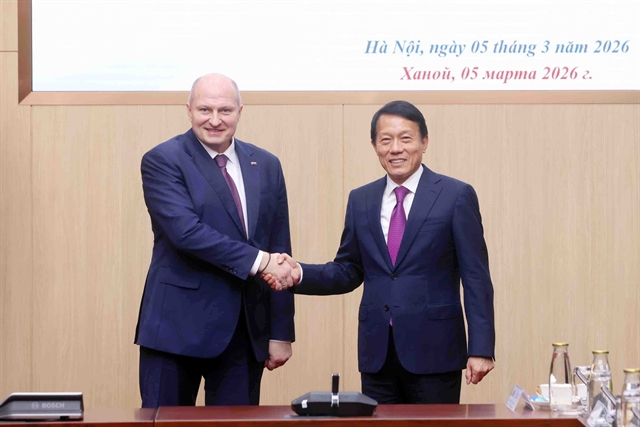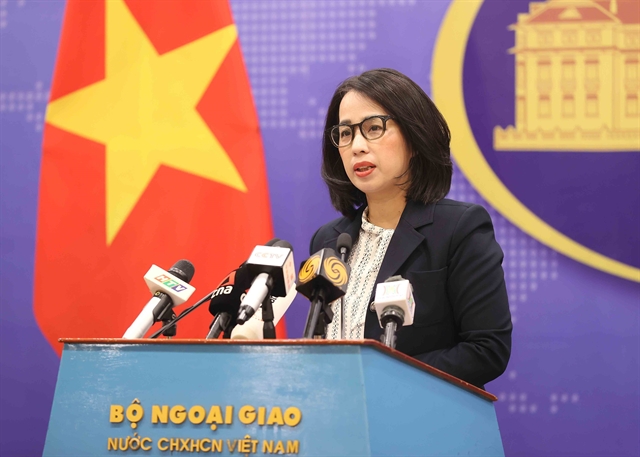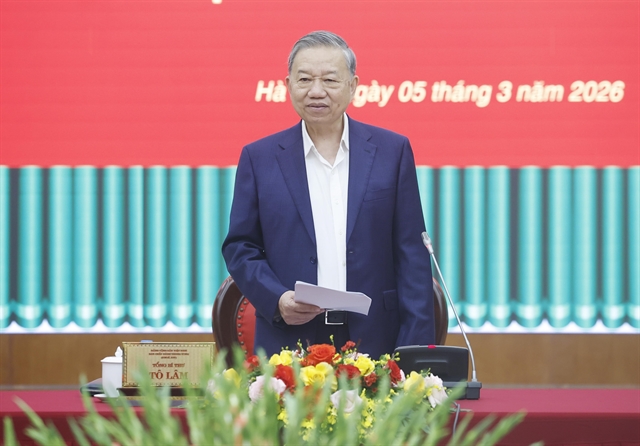 Politics & Law
Politics & Law

 |
| A representative of the Vietnamese delegation speaks at the event marking the ratification of the UN Convention against Cybercrime, held in New York in December 2024. VNA/VNS Photo |
By Khổng Hà
Later this month, national flags of nearly 100 countries will fly high above Hà Nội as the capital hosts the signing ceremony of the United Nations Convention against Cybercrime, also known as the Hanoi Convention.
For the first time, an international treaty on cybersecurity bears the name of the Vietnamese capital -- a powerful affirmation of Việt Nam’s growing profile in international cooperation on cybersecurity, and a milestone in the country’s multilateral diplomacy.
From Asia to Europe, from Africa to the Americas, nations will come together to sign a historic treaty symbolising a shared commitment to strengthening cooperation in the global fight against cybercrime -- a borderless threat that permeates every corner of modern life.
But beyond its legal scope, the Hanoi Convention embodies a symbol of solidarity, trust and shared responsibility in safeguarding the digital realm -- where every individual can play a role in defending against online crime.
In today’s interconnected world, cybercrime has become one of the most pervasive and dangerous global challenges. In Việt Nam alone, more than 100,000 cyber incidents were recorded last year, ranging from online scams and financial fraud to sophisticated attacks targeting critical information systems.
Globally, what once began as isolated acts by small groups of hackers has evolved into organised, transnational criminal networks targeting national financial systems, energy grids, and security institutions worldwide.
The borderless danger threatens not only public safety but also the sovereignty and stability of all nations. Facing this reality, the international community agreed that a concerted global response was urgently required.
In 2019, the UN General Assembly adopted a resolution launching negotiations for a comprehensive international convention to combat cybercrime. This marked the first attempt in more than two decades for the UN to develop a global criminal justice instrument addressing new forms of transnational crime -- the first since the 2000 Palermo Convention against Transnational Organised Crime.
After over 30 months of negotiations, with eight formal and five intersessional meetings, the UN General Assembly adopted the final text of the Convention in December 2024, with broad consensus among member states. Comprising nine chapters and 71 articles, the Hanoi Convention provides a comprehensive legal framework for global cooperation in tackling cybercrime effectively.
 |
| Acting Minister of Foreign Affairs Lê Hoài Trung (centre), UN Deputy Secretary-General and Executive Director of the UN Office on Drugs and Crime (UNODC) Ghada Waly (second from left), and Deputy Minister of Public Security Lê Quốc Hùng (second from right) co-chair an event on the Convention at UN Headquarters in New York on September 22. VNA/VNS Photo Thanh Tuấn |
The Hanoi Convention criminalises a wide range of offences carried out via cyberspace, including unauthorised system access, online fraud, data interference, malware dissemination and child exploitation.
In addition to identifying criminals, the agreement establishes mechanisms for judicial cooperation and legal assistance among countries, such as information exchange, data transfer, extradition of cybercriminals and recovery of assets derived from cybercrime.
These are important tools that enable countries to coordinate more effectively in investigating and arresting criminals in a borderless environment.
The adoption has been hailed as a landmark by the international community.
Ghada Waly, UN deputy secretary-general and executive director of UN Office on Drugs and Crime (UNODC), described it as a launching pad for the global fight against cybercrime, highlighting it as the UN’s first criminal justice treaty in more than 20 years, crafted to address both current and emerging forms of cybercrime.
She commended Việt Nam’s efforts to prepare for the signing ceremony and pledged UNODC’s continued support for member states in adopting and implementing the Convention.
As technology accelerates the scale and complexity of criminal activities -- including terrorism and drug trafficking to human trafficking and money laundering -- the Hanoi Convention arrives at a critical moment for nations to unite against such threats.
Similarly, the United States Department of State said that it welcomed the Ad Hoc Committee on Cybercrime’s adoption of the Convention.
“The agreement expands the global fight against cybercrime, one of the most pervasive challenges of our time, affecting communities around the world,” its statement said.
The Hanoi Convention offers countries additional tools to cooperate — particularly in law enforcement — to address cybercrime and protect vulnerable groups, especially children.
 |
| Suspects in a transnational fraud ring are arrested by the local police of the northern mountainous province of Cao Bằng in September. VNA/VNS Photo |
Timely move
In recent times, the Ministry of Public Security (MPS) and police in the northern mountainous province of Cao Bằng have dismantled a large-scale online fraud ring.
The group, consisting of 39 suspects, impersonated law enforcement officers and used spyware to steal more than VNĐ700 billion (over US$26.5 million) from thousands of victims nationwide.
The network was transnational in nature, with its servers located overseas to exploit jurisdictional loopholes between countries.
However, through sharp investigative work and coordinated action across multiple provinces and agencies, the ministry successfully busted the ring. The success not only prevented massive financial losses but also reinforced public trust in the police’s capacity to maintain order and security in the digital age.
Việt Nam’s Communist Party and State have long recognised the strategic importance of combating cybercrime, especially as the country advances its National Digital Transformation Programme.
The implementation of the Hanoi Convention therefore receives strong leadership and guidance at the highest level.
Major General Lê Xuân Minh, head of the Department of Cyber Security and High-Tech Crime Prevention at the MPS, said relevant agencies had reviewed the entire legal framework to ensure compatibility with the agreement’s requirements and national realities.
Việt Nam is currently working to merge the 2015 Law on Cyber Information Security and the 2018 Law on Cybersecurity into a single, unified law for more effective governance of the sector.
At the same time, amendments to the Penal Code are under consideration to update definitions of technology-related crimes in line with the Hanoi Convention and to facilitate cooperation on extradition, judicial assistance and evidence-sharing.
Another significant step is the enactment of the Law on Personal Data Protection in June 2023, which creates a legal foundation to ensure citizens' privacy in the digital environment.
This is a timely measure that aligns with the implementation of the Convention while still upholding the requirements to protect human rights and personal data - a principle deeply embedded in the Convention itself.
Alongside legislative reforms, Việt Nam is strengthening its law enforcement capacity.
Specialised cybercrime and high-tech units across the ministry and provincial police forces are being equipped with advanced tools, training and personnel.
Intensive training courses and international cooperation programmes are continuously being rolled out to ensure officers can keep pace with the rapidly evolving technology landscape and the increasingly sophisticated methods used by cybercriminals.
In recent years, Vietnamese police have successfully dismantled numerous major online crime rings, from transnational gambling syndicates worth trillions of đồng to international hacking groups targeting Vietnamese enterprises.
The achievements demonstrate the growing professionalism and capability of Việt Nam’s law enforcement agencies.
 |
| Deputy Minister of Foreign Affairs Đặng Hoàng Giang speaks at a press conference on October 8 in Hà Nội to prepare for the signing ceremony of the UN Convention against Cybercrime. VNA/VNS Photo Phạm Kiên |
However, as Deputy Minister of Foreign Affairs Đặng Hoàng Giang said: “The adoption is only the first step. What truly matters is the willingness and determination of countries to cooperate effectively in implementation.”
He added that Việt Nam must continue strengthening its institutions, legal framework and human resources to coordinate more efficiently with international partners.
“The human factor is key,” he said. “Each officer and citizen must enhance awareness, skills, and resilience to jointly contribute to the global effort against cybercrime.”
Police's key role
Within the broader framework of the Hanoi Convention’s implementation in Việt Nam, the police force plays a leading role.
From the negotiation stage, the MPS served as the key agency, coordinating with the Ministry of Foreign Affairs to lead technical discussions.
As host of the signing ceremony, the MPS has been entrusted by the Party and State to take the lead in organising the event, preparing policy proposals, and coordinating among ministries and sectors to ensure smooth implementation.
 |
| Deputy Minister of Public Security Phạm Thế Tùng delivers his speech at a conference in August in Hà Nội to assess the preparedness for the signing ceremony of the Convention. VNA/VNS Photo Phạm Kiên |
According to Deputy Minister Phạm Thế Tùng of the MPS this reflects the strong confidence in the ministry’s competence, experience and reputation in organising multilateral activities, thereby affirming the prestige and position of the ministry in the international arena.
Việt Nam has successfully hosted numerous major regional and global security events, such as the ASEAN Ministerial Meeting on Transnational Crime, the 80th Interpol General Assembly, and the 39th ASEANAPOL Conference, demonstrating its capability and reliability as an international partner.
The experience and expertise accumulated through those events provide the foundation for the police force to confidently complete the tasks assigned by the Party and State in implementing the Hanoi Convention, contributing to enhancing the country's image and spreading the message of a proactive Việt Nam that integrates globally, shares responsibilities, and takes actions for a safe cyberspace.
As scheduled, following the signing ceremony later this month, the Ministry of Public Security will continue to serve as the lead agency for implementation.
A steering committee, chaired by a deputy minister, has been established with specific tasks assigned to more than 30 units across the ministry and provincial police forces.
Their mission is to ensure absolute safety and security throughout the implementation process and to prevent emerging cyber threats before they occur.
The MPS has also been developing around 100 preventive and response plans to proactively counter new cyber risks.
The ministry is also closely coordinating with relevant ministries to unify the roadmap for internalising the provisions of the Hanoi Convention into the Vietnamese legal system.
For example, to meet its operational requirements, Việt Nam is preparing to establish a 24/7 national contact point for cybercrime, managed by the Department of Cyber Security and High-Tech Crime Prevention, allowing for real-time coordination with police counterparts worldwide.
The ministry is further strengthening cooperation with domestic telecommunications companies, technology firms and banks to enhance early detection and prevention of cybercrime while supporting businesses in safeguarding their digital infrastructure and customers.
At the local level, provincial anti-cybercrime units are intensifying collaboration with each other and with the Mobile Police Command to promptly handle widespread security incidents.
Images of Vietnamese police officers tirelessly tracing malicious codes and tracking criminals behind anonymous IP addresses have become emblematic of Việt Nam’s steadfast resolve to defend its cyberspace.
 |
| Participants at an event on a safe digital future at UN Headquarters in New York in September. VNA/VNS Photo Thanh Tuấn |
Protecting citizens online
Given the inherently transnational nature of cybercrime, international cooperation remains the decisive factor for success.
Through the Hanoi Convention, Việt Nam will have greater opportunities to expand and deepen collaboration with global partners.
Maj Gen Minh expressed hope that once it is signed and ratified, it would create a new legal framework for countries to jointly combat cybercrime, share information, coordinate investigations, recover illicit assets and facilitate extradition.
In practice, this could mean that if a cybercriminal defrauding Vietnamese citizens flees abroad, authorities could request foreign partners to arrest and return the suspect based on the framework, and vice versa. Such coordination and mutual trust would gradually eliminate the so-called "safe havens" where cybercriminals operate.
Việt Nam has been actively connecting with the global cybersecurity network. It has official cooperation with Interpol and ASEANAPOL, and participates in the activities of the Interpol Cybercrime Working Group.
The country also has signed memoranda of understanding on cybercrime information exchange with Japan, the Republic of Korea, Israel, the United Kingdom, and the United States.
In September, Việt Nam joined China and ASEAN countries in a joint campaign to crack down on online gambling syndicates, underscoring its commitment to regional security collaboration.
The implementation of the Hanoi Convention will also open new avenues for Việt Nam to receive technical and capacity-building support from developed countries and international organisations, including the UNODC. Support may include training for cyber investigators, upgrading digital forensics systems and participating in global research projects on cybersecurity.
Deputy Minister Giang said that Việt Nam now would have the chance to take advantage of international resources, from technology to human resources, to serve the goal of ensuring a safe environment for national development.
At the same time, it would also learn from other countries' experiences and modern technology to improve the effectiveness of preventing and combating cybercrime.
“This is a double benefit, both raising the national level and contributing to the world's common efforts,” Giang said.
Moreover, through proactive implementation and international engagement, Việt Nam’s image as a responsible, reliable and constructive partner will continue to rise on the world stage.
In his message ahead of the signing ceremony, State President Lương Cường highlights that hosting the event represents “a precious opportunity for Việt Nam to showcase the image of a peaceful nation with hospitable people to friends around the world”.
The presence and endorsement of more than 90 countries at the Hanoi Convention not only acknowledge Việt Nam’s contributions but also lay a solid foundation for sustained cooperation in the years ahead. VNS

